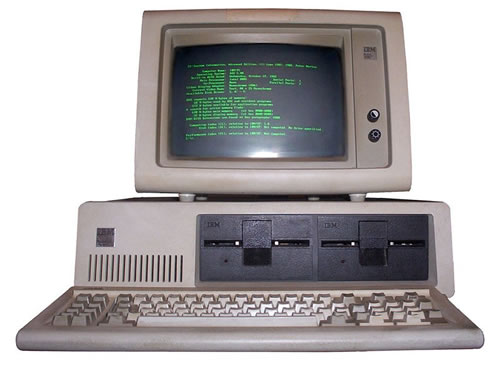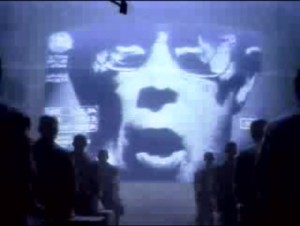[caption id="attachment_534" align="aligncenter" width="420" caption="IBM clone PC"]
 [/caption]
[/caption]IBM PC vs Apple Hardware
Until recently the "IBM PC" has absolutely killed more proprietary hardware (like Apple products) in affordability.
Our family owned a Laser 128 apple clone, but apart from that we have over the years owned 1 TRS80, 2 386s, 1 486, 2 Pentiums, 1 Celeron, 1 Athlon64, 2Athlons, 1 zeon AND zero apples. Now this is with all the exposure to Apples in the school system (hence the Laser 128)
There was only 1 "Apple" computer company making hardware, but there are many many computer companies building "IBM clones". We could purchase a 386 for $1500 or we could purchase the same computer from Apple for double the price. IBM decided to "open" the form-factor for their IBM PC so that low cost manufacurers overseas could "clone" or copy the hardware without paying licensing fees or battling an army of lawyers. Suddenly this meant there were 5 -10-15-20 soundcard manufacturers, and 20 video card manufacturers, and 10 hard drive manufacturers and 40 Motherboard manufacturers all able to design compatible products and compete on features and price. While Apple design has remained compelling, it is like Ford's model T. "Any colour you like as long as it is black".
I attended a wedding a few years ago and listened to a man chatting at a table who had worked for IBM for years comment; "It's really too bad that IBM opened up their PC design, they could have made a killing if they had just held onto that and not let others use their design and build components". He missed it. He didn't understand that it was precisely because others could have the blueprints that we had commodity computers and incredible demand. (Understand there is high demand for affordable computers, and very little demand for unaffordable computers)
Open Standards let us cooperate and work together
There are lots of smart people out there. They don't all do things the same way, we have chaos or war unless people can agree on how to work together. that is why we have "standards". Those attempts to get everyone playing by the same set of rules so we can work together. Some examples;
- A green light in traffic means...?
- In my country we drive on which side of the road?
- A Meter is exactly how long?
- Do you use POP3 or SMTP for receiving or sending email?
- Are you reading an HTML web page right now transferred by HTTP (HyperText Transfer Protocol)?
So standards are smart right? They allow people who are willing to negotiate or compromise to choose a common method (often it is not the "best") but it is reasonable for the greatest number of people who are willing to collaborate.
Open versus closed design
Some silly companies think that cooperating with others reveals "weakness". They think that they are smarter than everyone else. They think everybody should do things their way and they work hard to avoid cooperating with others. Lets call them "big brothers" because they like to be in charge of the customer and remove choice. Here the 2 philosopies collide. The collaborators and the "big brothers. Collaborators try to make things like software and file formats work with others including "big brother's. The "big brothers" work hard to obscure and continually update their formats to make them difficult to copy. Big brother is all about control. Ironically Apple chose imagery from 1984 for their 1984 Superbowl ad where they were urging people to break free from the IBM PC. ROFL! OK, when it comes to file formats, there are many "big brothers" out there. Kudos! It was a brilliant Ad anyways Apple! (as was this um... "modification")
[caption id="attachment_532" align="aligncenter" width="300" caption="Big Brother knows best!"]
 [/caption]
[/caption]Office document formats and the battle for useability
For years, Microsoft's office formats have been the only game in town. MS Word, MS Excel etc. If you try exporting to another format, they you "lose features" and the docs never did look quite right. Microsoft is no longer the only game in town, but they are holding on hard to the idea that they know best, that cooperation is not as good as being uncooperative inovation. Every version of Microsoft office introduced new formats that would not work with the old versions of the program (or would not work well). In order to make things work, you would have to "upgrade" to the new version. (Now there was nothing wrong with the old one, its just that Auntie Sue bought a new computer that had the new version and now you can't read what she writes..) So pull out your wallet and pay money every year to be able to continue doing the same things you did last year. That is how the "big brothers" make your life. Expensive and difficult.
Enter the giant killers.
Open Office has been looming on the horizon for years. Their converters for MS Office documents have been getting better and better. Now you can use free software that works pretty much as well as the MS Office programs, and it can convert to and from those formats. Open Office saves you paying hundreds of dollars to Microsoft, and new versions address the version issues Microsoft creates.

Google has created an online system called Google Docs that allows you to create, upload, edit and download documents online. No software other than your web-browser is required, and there is a a high level of compatibility with other office formats.
These companies are making your life easier, more affordable, and are being open and transparent about their formats so that you have fewer hassles. Their "open design" is translating into "Good design" and putting money back in the wallets of people who have been paying "rent" on their software for far too long.
This comment has been removed by a blog administrator.
ReplyDeleteA comparably equipped stock apple and pc are actually almost the same in terms of pricing now. Where apple gets you is the upgrades (both at purchase and in the future). Compare the cost of doubling the RAM at the apple store vs dell vs ncix.
ReplyDelete